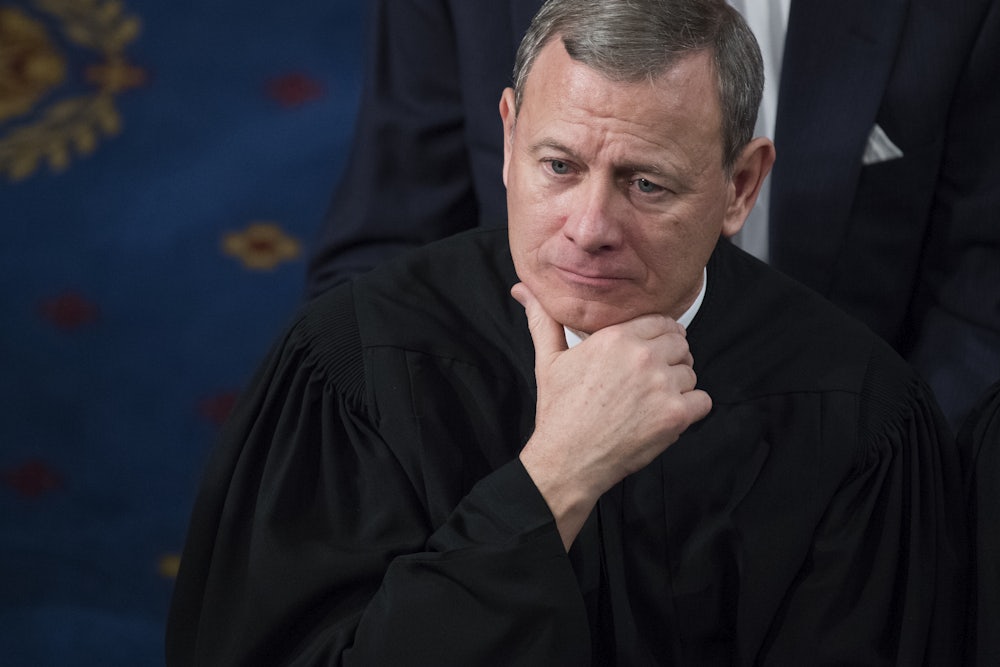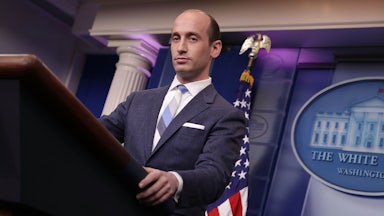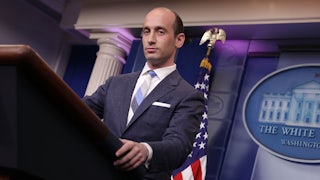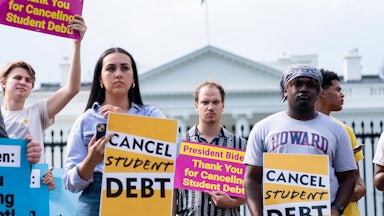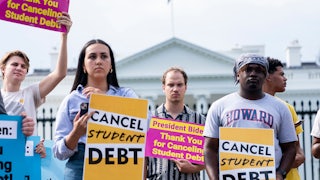A weird thing about President Biden’s student loan relief order last week is that the debate surrounding it is mostly about the policy itself. A few commentators and elected officials have questioned the order’s legality, to be sure. But a considerably greater portion of the debate instead revolves around the policy’s perceived merits or drawbacks. For once, legal and constitutional concerns have taken a back seat to centrists hawking about inflation and Republicans accusing the administration of offering freebies to layabouts.
This isn’t how it typically goes these days. Usually whenever the White House tries to do something, it must first fight off lawsuits from the opposing party and its ideological allies. The Biden administration has fought in court to defend environmental regulations, Covid-19 vaccine mandates, civil rights protections for LGBT Americans, and more from Republican attorneys general and corporate interests. Executive lawfare is a bipartisan tradition as well: The Trump administration faced lawsuits from Democratic-led states and liberal interest groups for, well, just about everything it did.
Student loan relief appears to be different. No such lawsuit has been filed against the Biden administration to stop the order from taking effect. It’s far from clear whether one can even be properly filed to challenge it. And even if one is filed, the Biden administration has good reason to think it can win. For this apparent victory, Democrats can thank the unlikeliest of duos: former President George W. Bush and the “war on terror.”
From where does Biden claim the power to wipe away so much student debt? The White House pointed to the Higher Education Relief Opportunities for Students Act of 2003, or HEROES Act for short. The law sprang from the September 11 attacks and a temporary measure passed by Congress in 2001 to allow the president to waive certain student loan requirements for those affected by the attacks. In 2003, Congress passed a broader version of the law in light of the then-ongoing wars in Afghanistan and Iraq and the large number of U.S. servicemembers who would have to repay loans while serving overseas. Though it was temporary at first, Congress later extended it in 2005 and then made it permanent in 2007.
The HEROES Act refashioned the White House’s post-9/11 authority in much broader terms. It allows the executive branch to “waive or modify any statutory or regulatory provision applicable to the student financial assistance programs under title IV [of the Higher Education Act]” whenever the administration “deems necessary in connection with a war or other military operation or national emergency.” The United States is not currently engaged in large-scale military operations in any foreign country, but it is still undergoing a national emergency thanks to the Covid pandemic, which has affected every single American’s life in some way.
The Trump administration famously used this power to grant student loan debtors a reprieve from making payments during the early stages of the pandemic. The Justice Department’s Office of Legal Counsel, which provides in-house legal advice to the executive branch, emphasized these invocations in its 25-page analysis of the order’s legality. The office’s lawyers argued that the HEROES Act’s broad language and recent precedents showed that the executive branch could take the sweeping action sought by Biden.
“Most notably, the Secretary [of Education]’s 2020 actions suspended the obligation to pay student debt for every student loan held by the United States, even though such relief undoubtedly was not necessary to avoid financial harm for some of the suspension’s beneficiaries,” the office concluded. “These applications of the [HEROES] Act—two of which were implicitly approved by Congress—plainly reflect an understanding that the statute affords flexibility for the Secretary to enact prophylactic waivers and modifications that extend beyond the particular hardship they aim to prevent.”
Not everyone is persuaded. Almost 100 House Republicans sent a letter to Speaker Nancy Pelosi last week where they derided Biden’s order as “an illegal act by a President desperate for a political win.” National Review’s Rich Lowry complained that the “legal justification for Biden’s move is so brazenly pretextual that it might make even Saul Goodman blush.” The Wall Street Journal’s editorial board fumed that “there has never been an executive action of this costly magnitude in peacetime” and claimed “nothing comes close to this half-trillion-dollar or more executive coup.” If only their blood pressure got this high when Biden’s predecessor almost got several members of Congress and former Vice President Mike Pence killed last year.
So why hasn’t anyone hauled the Biden administration into court to stop it? One problem for any potential lawsuit is finding a plaintiff. Time magazine reported this week that conservative legal activists are currently searching for someone who might have standing to challenge the order in court. But that requires someone who suffered some kind of legally cognizable injury from Biden’s order. The debtors themselves aren’t good candidates. For one, nobody with student loans is going to sue the Biden administration so that they pay more of them. And even if they did, it would be strange to argue that loan forgiveness is an “injury” in any sense of the word.
Time, citing conservative lawyers, floated some hypothetical litigants who might be able to bring a challenge. Among the prospective plaintiffs are student loan servicers, which act as middlemen between the federal government and the debtors themselves. It’s unclear how they would be injured in any way by this particular change in federal regulations. Another alternative offered by the magazine would be a borrower who makes more than $125,000 a year and therefore doesn’t qualify for the order’s relief. Means-tested programs have generally survived such scrutiny before—there would be little incentive to keep means-testing benefits if they hadn’t. It was also suggested that one of the chambers of Congress could have standing to challenge it. But that would require Republicans to win control of one of them first.
Other typical avenues of executive lawfare are likely to be useless. An increasingly common tactic is for state attorneys general to sue the opposing party’s president to stop some sort of executive action by arguing that it somehow affects the state’s interests. No Republican attorney general has tried to attack Biden’s order on these grounds, however. Their state university systems are still getting the student loan money, after all—Biden’s order only affects the debtors’ repayments to the federal government.
It is healthy and normal to hold presidents accountable when they do something beyond the bounds of federal law or constitutional power. At the same time, it’s also refreshing to be able to debate a policy decision on its merits. So much of our political system is now channeled through the courts that it often feels like the merits or drawbacks of a particular policy item get subsumed by arcane questions of administrative law. Some of this can be blamed on the atrophy of Congress’s lawmaking ability; some can be traced to the federal courts’ willingness to intervene in these disputes more often. Whatever the cause, it is less than ideal for basic democratic governance.
It’s still possible, of course, that some litigant backed by the conservative legal movement somehow manages to persuade a Trump-appointed federal judge in Texas that Biden’s order harmed them in some way. After conservatives used that state’s abortion-bounty law to do an end run around federal civil rights laws and the Supreme Court’s precedents at the time, anything is possible. But for now, it’s nice to see the nation debating whether something the president did is a good idea instead of whether five justices on the Supreme Court will actually allow it to happen.
